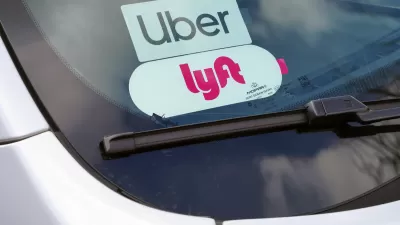Change is afoot for transportation around destinations like Southwest Florida. Are cities like Tampa still planning too much for the old rental car model, and not for a future of transportation network companies, carsharing, and self-driving cars?

Robert Trigaux wonders if efforts to build a "a big rental car facility at the next-generation Tampa International Airport," reflects a planning focus that looks back rather than forward. The problem, according to Trigaux, is a growing body of evidence that U.S. business travelers are choosing to travel with the help of transportation network companies like Uber and Lyft rather than rental cars.
The study, by travel- and expense-management software provider Certify, finds that "Uber accounted for 43 percent of ground transportation transactions, while rental cars had 40 percent. Led by Uber and Lyft, ride-hailing services surpassed rental cars for the first time in the fourth quarter of 2015 and have since widened their lead."
The trend threatens to impact Southwest Florida beyond the plans to build a large rental car facility near the Tampa International Airport. The rental car company Hertz relocated to Florida from New Jersey in 2013, bringing hopes of expansion and thousands of new jobs with it. Now, however, Hertz "has issued recent earnings warnings and its stock, just under $30 a share in mid 2014, closed Thursday at just over $9 a share."
Trigaux also notes that Zipcar will soon launch its membership-based car-sharing service in Downtown Tampa. As reported in January 2013, Zipcar will be included in the footprint of the new airport rental car facility.
FULL STORY: As Uber grows and rental car companies struggle, is Tampa Bay planning for yesterday?

Alabama: Trump Terminates Settlements for Black Communities Harmed By Raw Sewage
Trump deemed the landmark civil rights agreement “illegal DEI and environmental justice policy.”

Study: Maui’s Plan to Convert Vacation Rentals to Long-Term Housing Could Cause Nearly $1 Billion Economic Loss
The plan would reduce visitor accommodation by 25% resulting in 1,900 jobs lost.

Planetizen Federal Action Tracker
A weekly monitor of how Trump’s orders and actions are impacting planners and planning in America.

Waymo Gets Permission to Map SF’s Market Street
If allowed to operate on the traffic-restricted street, Waymo’s autonomous taxis would have a leg up over ride-hailing competitors — and counter the city’s efforts to grow bike and pedestrian on the thoroughfare.

Parklet Symposium Highlights the Success of Shared Spaces
Parklets got a boost during the Covid-19 pandemic, when the concept was translated to outdoor dining programs that offered restaurants a lifeline during the shutdown.

Federal Homelessness Agency Places Entire Staff on Leave
The U.S. Interagency Council on Homelessness is the only federal agency dedicated to preventing and ending homelessness.
Urban Design for Planners 1: Software Tools
This six-course series explores essential urban design concepts using open source software and equips planners with the tools they need to participate fully in the urban design process.
Planning for Universal Design
Learn the tools for implementing Universal Design in planning regulations.
Caltrans
Smith Gee Studio
Institute for Housing and Urban Development Studies (IHS)
City of Grandview
Harvard GSD Executive Education
Toledo-Lucas County Plan Commissions
Salt Lake City
NYU Wagner Graduate School of Public Service





























